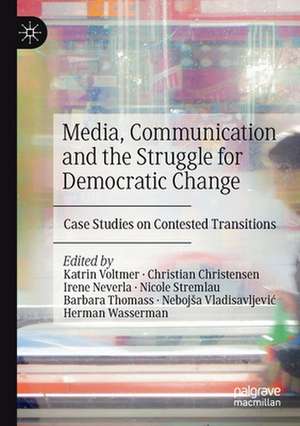Media, Communication and the Struggle for Democratic Change: Case Studies on Contested Transitions
Editat de Katrin Voltmer, Christian Christensen, Irene Neverla, Nicole Stremlau, Barbara Thomass, Nebojša Vladisavljević, Herman Wassermanen Limba Engleză Paperback – 6 sep 2020
| Toate formatele și edițiile | Preț | Express |
|---|---|---|
| Paperback (1) | 469.91 lei 43-57 zile | |
| Springer International Publishing – 6 sep 2020 | 469.91 lei 43-57 zile | |
| Hardback (1) | 644.63 lei 43-57 zile | |
| Springer International Publishing – 6 sep 2019 | 644.63 lei 43-57 zile |
Preț: 469.91 lei
Preț vechi: 552.84 lei
-15% Nou
Puncte Express: 705
Preț estimativ în valută:
89.92€ • 94.12$ • 74.84£
89.92€ • 94.12$ • 74.84£
Carte tipărită la comandă
Livrare economică 31 martie-14 aprilie
Preluare comenzi: 021 569.72.76
Specificații
ISBN-13: 9783030167509
ISBN-10: 303016750X
Pagini: 305
Ilustrații: XVII, 305 p. 12 illus.
Dimensiuni: 148 x 210 mm
Greutate: 0.39 kg
Ediția:1st ed. 2019
Editura: Springer International Publishing
Colecția Palgrave Macmillan
Locul publicării:Cham, Switzerland
ISBN-10: 303016750X
Pagini: 305
Ilustrații: XVII, 305 p. 12 illus.
Dimensiuni: 148 x 210 mm
Greutate: 0.39 kg
Ediția:1st ed. 2019
Editura: Springer International Publishing
Colecția Palgrave Macmillan
Locul publicării:Cham, Switzerland
Cuprins
1.Introduction: Democratization conflicts as communicative contestations.- 2. Media, power, citizenship: democratization in an age of media abundance.- 3. Conflict-Sensitive Journalism? Journalistic Role Perceptions and Practices in Democratization Conflicts.- 4. Peace but at what cost? Media coverage of elections and conflict in Kenya.- 5. Creativity and strategy: how civil society organizations communicate and mobilise in Egypt, Kenya, Serbia and South Africa.- 6. Tweeting in precarious times: Comparing Twitter use during the 2013 general election in Kenya and the 2012 presidential election in Egypt.- 7. Minority Media, Democratization conflicts and the politicization of Coptic communal identity in Egypt.- 8. Hybrid governance, strategic communication and the quest for institutional legitimacy.- 9. Communicating power and resistance in democratic decline: the 2015 smear campaign against Serbia's ombudsman.- 10. Dialogue of the Deaf: Listening on Twitter and Democratic Responsiveness during the 2015 South African State of the Nation Address.- 11. The Participation Approach in Media Development Cooperation.- 12. Conclusion.
Notă biografică
Katrin Voltmer is Professor of Communication and Democracy at the University of Leeds, UK.
Christian Christensen is Professor of Journalism at Stockholm University, Sweden.
Nicole Stremlau is Research Professor in the Humanities at the University of Johannesburg, South Africa and Head of the Programme in Comparative Media Law and Policy, Centre for Socio-Legal Studies, at the University of Oxford, UK.
Irene Neverla is Professor Emerita at the Institute of Journalism and Mass Communication, University of Hamburg, Germany.
Barbara Thomass is Professor for International Comparison of Media Systems at the Ruhr-University of Bochum, Germany.
Nebojša Vladisavljević is Associate Professor at the Faculty of Political Science, University of Belgrade, Serbia.
Herman Wasserman is Professor of Media Studies and Director of the Centre for Film and Media Studies, University of Cape Town, South Africa.
Textul de pe ultima copertă
This book investigates the role of media and communication in processes of democratization in different political and cultural contexts. Struggles for democratic change are periods of intense contest over the transformation of citizenship and the reconfiguration of political power. These democratization conflicts are played out within an increasingly complex media ecology where traditional modes of communication merge with new digital networks, thus bringing about multiple platforms for journalists and political actors to promote and contest competing definitions of reality. The volume draws on extensive case study research in South Africa, Kenya, Egypt and Serbia to highlight the ambivalent role of the media as force for democratic change, citizen empowerment, and accountability, as well as driver of polarization, radicalization and manipulation.
Caracteristici
Theorizes democratization within a communication framework Explains normative dilemmas of journalism and media outside established western democracies Provides guidance for practitioners of media development working in conflict zones
